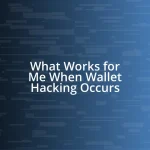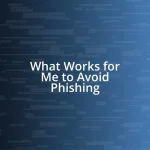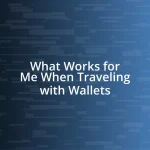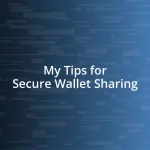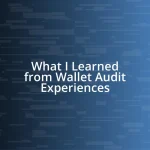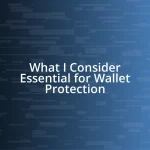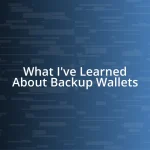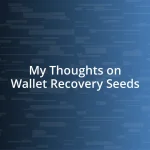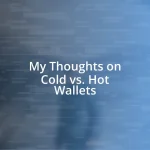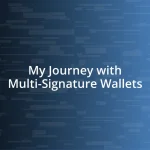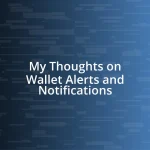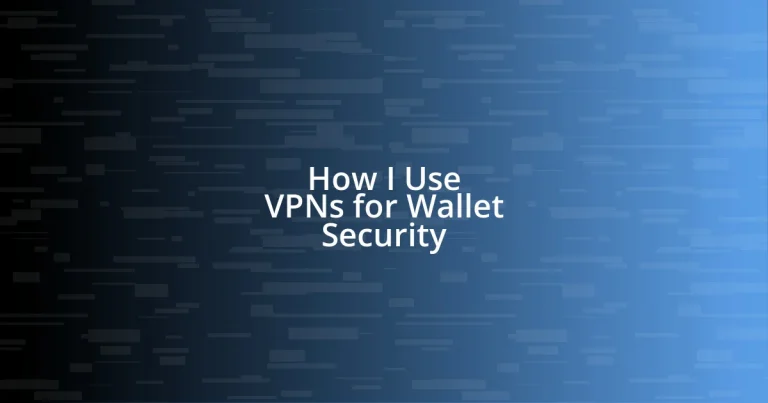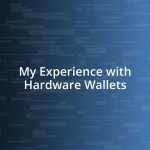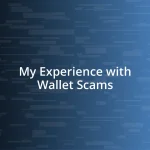Key takeaways:
- Using a VPN encrypts your data and protects your digital wallet, especially on public Wi-Fi, enhancing transaction security and peace of mind.
- Choosing a reputable VPN provider with a no-logs policy, strong encryption, and good customer support is essential for safeguarding financial information.
- Regularly configure wallet security features, such as enabling two-factor authentication and monitoring transactions, to maintain long-term security of digital assets.
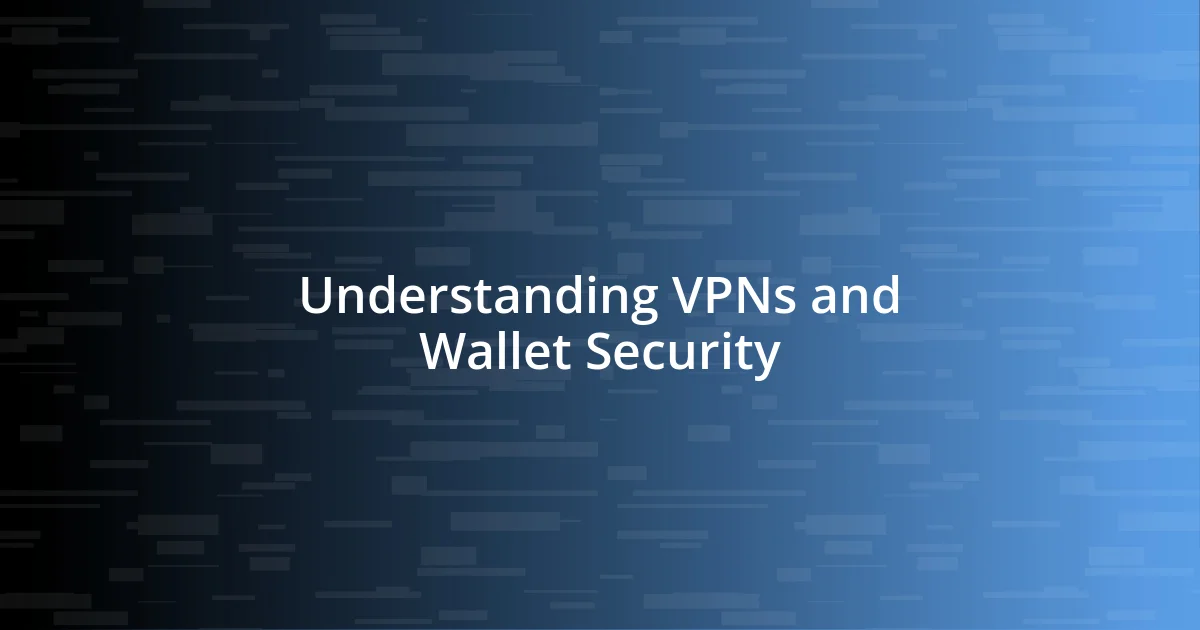
Understanding VPNs and Wallet Security
To fully grasp how VPNs enhance wallet security, it’s essential to understand what a VPN does. Essentially, a Virtual Private Network (VPN) shields your internet connection, encrypting your data and masking your IP address. This layer of protection is crucial, especially when accessing your digital wallet on public Wi-Fi. Have you ever noticed how convenient it is to use free Wi-Fi but felt a little uneasy about security? I’ve been there, and using a VPN transformed how I engage with my online transactions.
I remember the first time I connected to my wallet while traveling and used a public hotspot. My heart raced at the thought of someone intercepting my sensitive information. What I learned was that a VPN creates a secure tunnel for my data, making it nearly impossible for cybercriminals to get a hold of it. This peace of mind is invaluable, knowing that my financial information remains private, no matter where I am.
Moreover, it’s not just about encryption but also about staying aware of my online footprint. Using a VPN adds an extra layer of caution, giving me the kind of control over my data that I’ve found tremendously empowering. Have you ever felt exposed online? With a VPN, that feeling melts away, and I can focus on what truly matters, like managing my investments safely and securely.
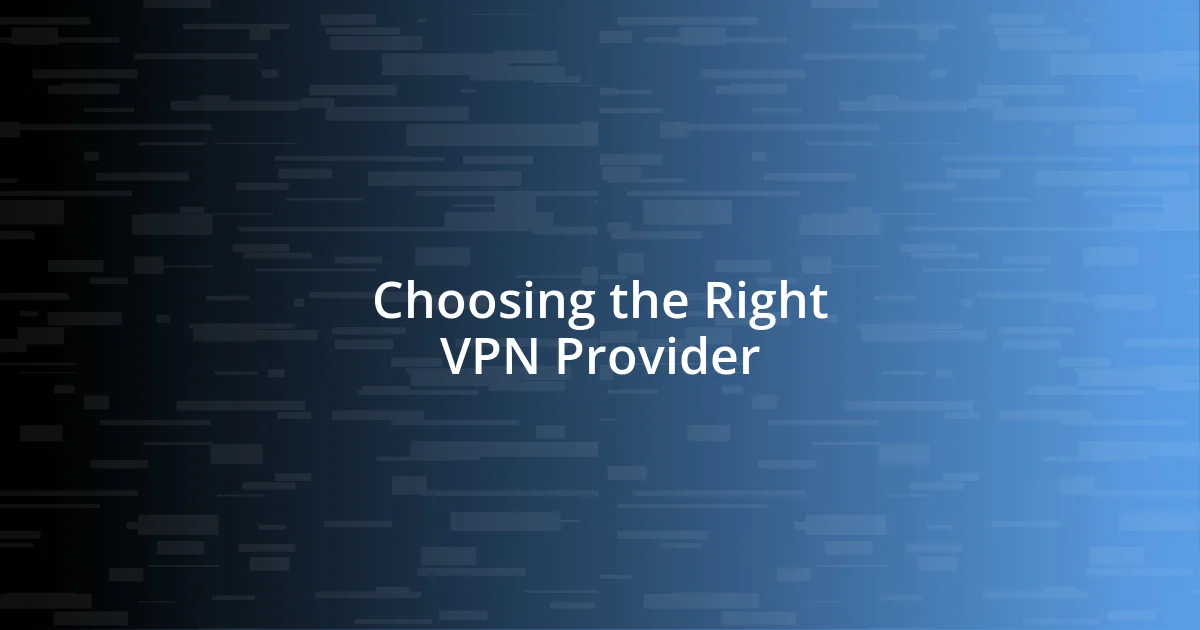
Choosing the Right VPN Provider
Choosing the right VPN provider is crucial for enhancing the security of your digital wallet. Not all VPNs offer the same level of protection, and when it comes to your financial data, you want the best. Personally, I learned this the hard way when I chose a well-advertised VPN that turned out to have a shaky privacy policy. It left me feeling vulnerable instead of secure.
Here are some key factors to consider:
- No-logs policy: Ensure the provider doesn’t keep records of your online activities.
- Encryption standards: Look for strong encryption methods, such as AES-256.
- Speed: A good VPN should not noticeably slow down your internet connection, especially for transactions.
- Server locations: More servers can mean better performance and access to content restricted in your area.
- Customer support: Reliable support is crucial if something goes wrong.
When I switched to a trusted VPN provider that ticked all these boxes, it was as if a weight was lifted off my shoulders. Not only was I investing in my security, but I finally felt I could navigate my digital wallet and make transactions without that nagging worry lingering in the back of my mind. Each time I connect to my VPN now, I’m reminded of that pivotal change and how it significantly bolstered my confidence in securing my financial transactions.
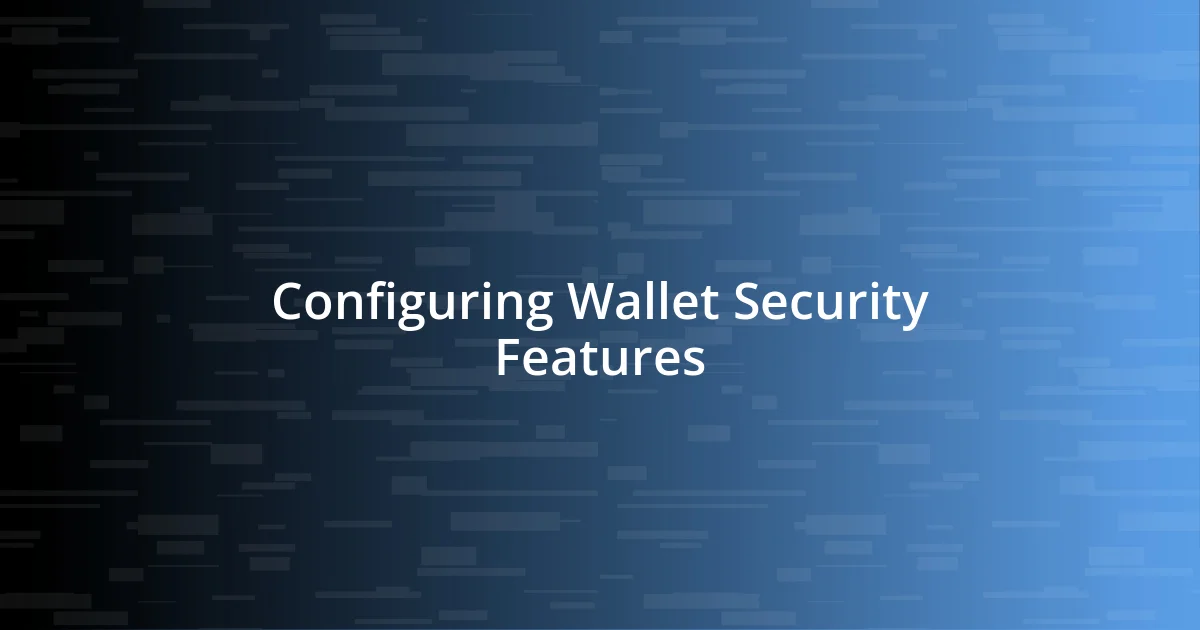
Configuring Wallet Security Features
Configuring the wallet security features is essential for safeguarding your digital assets. I remember feeling overwhelmed when I first set up security options on my wallet, but taking the time to adjust these settings was a game changer. For instance, enabling two-factor authentication (2FA) not only added a crucial layer of protection but also made me feel more secure, knowing my wallet was less accessible to potential intruders.
One feature I highly recommend is setting up alerts for any transactions. Initially, I was hesitant, thinking it might be too intrusive. However, once I started receiving notifications, I felt a sense of control over my finances. It allowed me to monitor my wallet activity in real-time, ensuring nothing went unnoticed. Have you ever experienced that rush of anxiety when a transaction you didn’t initiate pops up? With alerts configured, those moments transformed from dread into immediate action.
It’s also important to regularly review your security settings and software updates. I often block the auto-update feature to ensure I know exactly what changes are being made. This proactive approach helps me stay informed about newly introduced security features, which I can evaluate and decide whether to activate or not. Staying ahead of potential vulnerabilities is not just a recommendation; it’s a mindset—one that I’ve cultivated as part of my digital security strategy.
| Feature | Recommendation |
|---|---|
| Two-Factor Authentication | Always enabled for additional security |
| Transaction Alerts | Set up for real-time monitoring |
| Security Updates | Review regularly; don’t rely on auto-update |
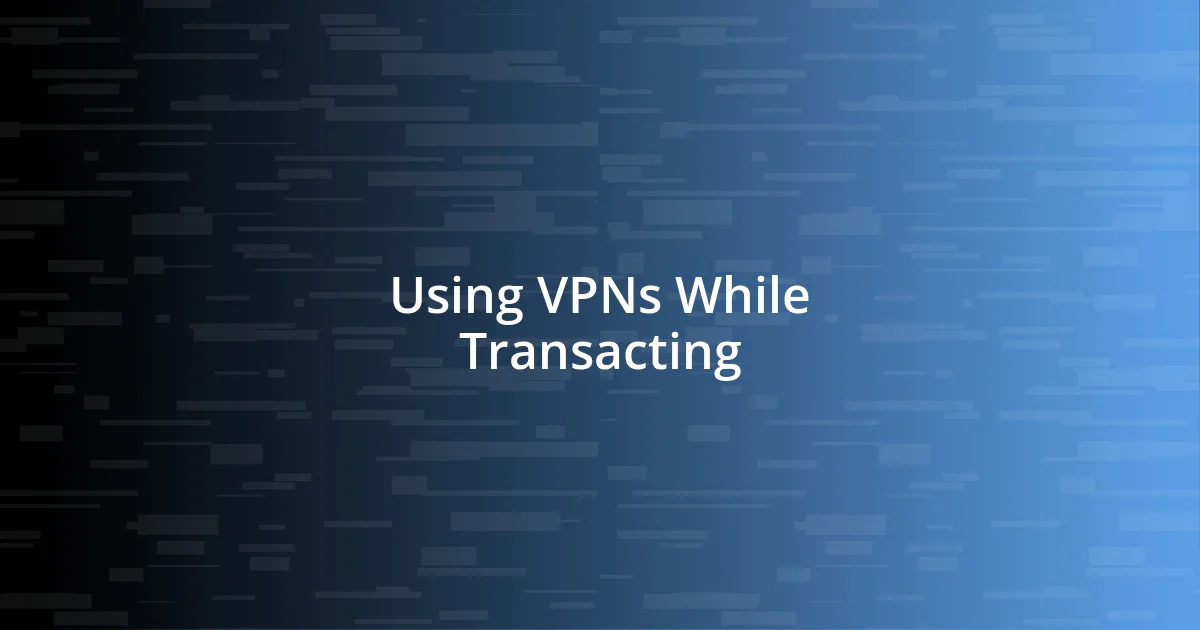
Using VPNs While Transacting
When I’m about to make a transaction, I always connect to my VPN first. It’s like putting on an invisible shield that guards my sensitive data as I navigate through the digital landscape. There’s a certain peace of mind that comes from knowing my connection is encrypted; it transforms the often stressful process of online transactions into something much more manageable. Have you ever felt anxious clicking that “pay now” button? With my VPN in place, I embrace that moment with confidence instead of fear.
On one occasion, I attempted a large transfer without my VPN—yes, a rookie mistake. My heart raced at the thought of my information flying through the digital ether unprotected. After that experience, I realized that the extra step of connecting to my VPN is non-negotiable. I often share this anecdote with friends who are hesitant about using a VPN—it’s simple, really: why make your financial interactions more vulnerable than they need to be?
I’ve also noticed that using a VPN can lead to a smoother transaction experience. The lag caused by a less secure internet connection can be frustrating, especially when you’re trying to finalize a critical payment. With my VPN’s optimized servers, transactions seem faster and more seamless. It’s a win-win. Who wouldn’t want to alleviate the hassle of slow connections while ensuring their financial safety? Each successful transaction reinforces my commitment to this habit, proving to me that security and efficiency can go hand in hand.
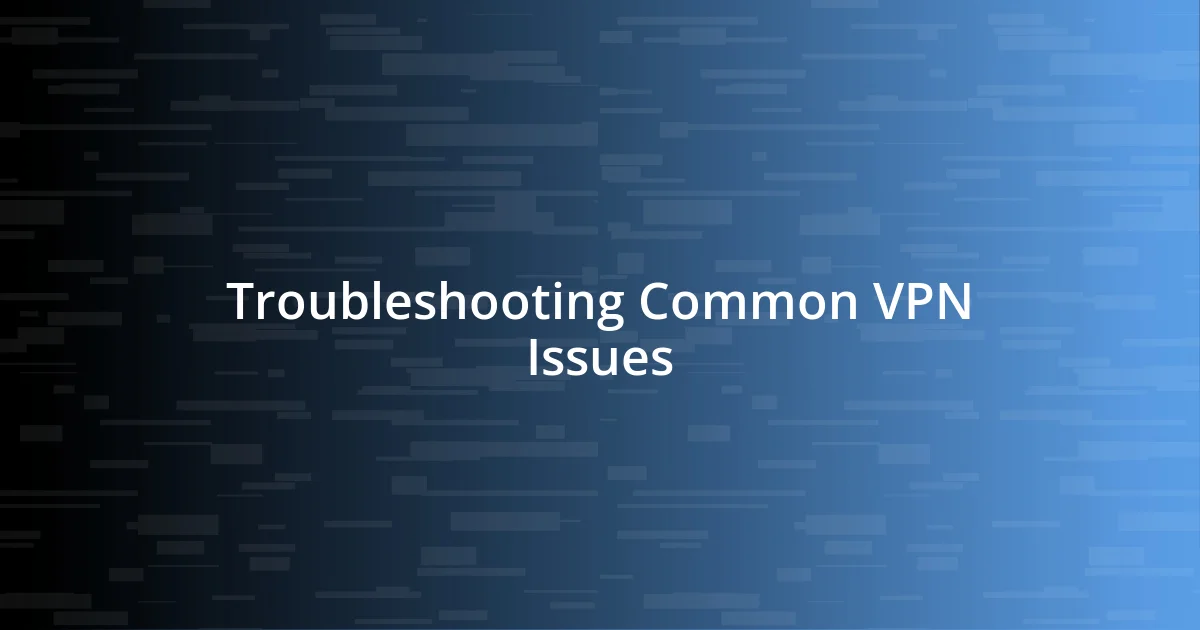
Troubleshooting Common VPN Issues
Encountering issues with your VPN can be frustrating, especially when you’re focused on securing your wallet. One common problem I’ve faced is connectivity issues—sometimes, the VPN just won’t connect. When this happens, I take a moment to check my internet connection first. More often than not, a simple router restart resolves the issue. Have you ever felt that sinking feeling when your VPN fails? It’s comforting to know that many times, the solution is just a few clicks away.
Another hiccup I’ve run into involves server selection. I’ve tried connecting to a server only to realize that it slows down my connection significantly. It took me a while, but now I routinely test different servers before engaging in important transactions. I learned that the closest server isn’t always the best choice; sometimes, a better connection halfway around the world delivers the speed I need. It’s a bit of trial and error, but finding the right server can drastically enhance my online security experience.
Additionally, I’ve had moments when my VPN suddenly drops during a transaction. The first time it happened, my heart sank; I felt completely exposed! Now, I always enable the kill switch feature, which automatically cuts off my internet connection if the VPN drops. It may seem extreme, but I find it provides that added layer of reassurance. Think about it—wouldn’t you prefer to know your information is safe, even if it means delaying a transaction rather than risking exposure?
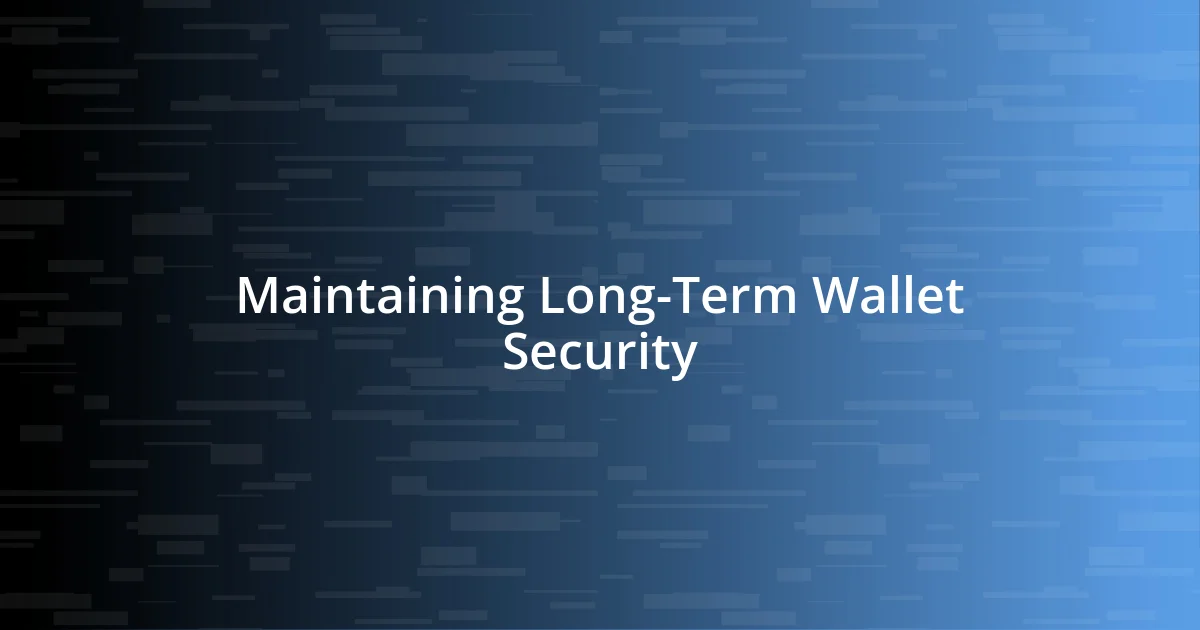
Maintaining Long-Term Wallet Security
To maintain long-term wallet security, consistently updating your VPN is key. I remember the time I neglected updates and faced a frustrating breach that could have been avoided. It’s like driving a car—would you skip an oil change and expect to run smoothly? Regularly ensuring your VPN software is current protects against vulnerabilities that could jeopardize your sensitive information.
Another essential practice is employing strong, unique passwords for your wallet and linked email accounts. I’ve seen firsthand how a compromised password can lead to a cascading series of problems. It’s as if you leave the front door open, inviting trouble. I use a password manager to keep track of my lengthy, complex passwords, which helps me maintain security without feeling overwhelmed. Have you ever felt the dread of remembering a complicated password? Automating this process has made my life so much easier and my wallets much safer.
Finally, regularly auditing your wallet activity is a smart strategy for sustaining security over time. I’ve developed the habit of checking my transactions weekly. It’s incredible what irregularities can show up if you pay close attention—once, I spotted a small transaction that didn’t belong to me. If I hadn’t been vigilant, it could have escalated into a more significant issue. Why not take a little time each week to ensure peace of mind? After all, staying proactive is crucial when it comes to protecting your financial assets.
